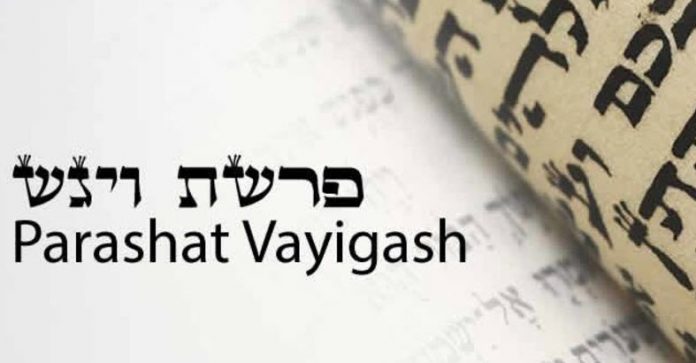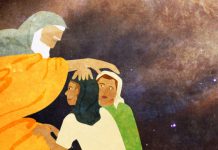Joseph Reunites With His Brothers, and the Whole Family Settles Down in Egypt
The tension was palpable. The confrontation, inevitable. Twelve brothers faced each other and the stakes were no less than the future of the Jewish people. Judah approached the Viceroy of Egypt, ready to appease or do battle. “Please allow me to say a few words in your ears because you are like Pharaoh” (Genesis 44:18). Judah was saying: “I honor you like Pharaoh, but you are also a liar like Pharaoh. And I am ready to take out my sword and finish you off together with Pharaoh!” (Rashi)
Replied the viceroy: “If you take out your sword, I’ll wring it around your neck!”
Judah turned crimson with rage. “What will we say to our old father?!”
“Tell him a wild animal came and ate him, just as you said when you sold your other brother!” came the reply.
Judah’s chest hairs stood on edge and burst through his shirt. He took a boulder in his hand and pulverized it. “Would you like Egypt to be destroyed? Let me stay instead of the lad (Benjamin), and he will be returned to his father. I was the one who guaranteed his return. Your servant our father will die when he sees Benjamin is missing.”
The viceroy replied, “Why didn’t you think of your father when you sold your other brother? Bring him here and I will take him instead of Benjamin – I’m certain no one guaranteed his return!”
The brothers were about to turn Egypt into a bloodbath. “We already told you that our brother is missing!” they exclaimed.
“No he isn’t!” came the reply. “He is right in this room!”
Upon hearing these words, the brothers began to look around the room in all directions. “Joseph, Joseph the son of Jacob, reveal yourself.” As the brothers were totally bewildered by this turn of events, they suddenly heard the words: “I am Joseph! Is my father still alive?” (Genesis 45:3, based on the Midrash)
Parshat Vayigash is the climax of the story of Joseph and his brothers. The master planner had his brothers exactly where he wanted them: To know that they were under his total control and he could easily have taken his revenge, while in fact he really loved them and could never hurt them. On the contrary, he actually saved them from the famine.
Joseph also harbored some bad feelings toward his brothers after being sold into slavery and being treated so cruelly. By putting his brother Benjamin into a similar situation and observing their efforts to save him, Joseph would be able to forgive them with a full heart. This way, the rift between them would be sealed, and the Jewish people would survive this ordeal!
Now let’s examine the Parsha from the beginning…
JUDAH’S PROPOSAL
Judah told Joseph: “Why do you want Benjamin for your valet? I am much better, older and stronger. Send me to fight your battles for you. Besides, if Benjamin is a thief, why would you want a thief around your house? He’ll really clean you out!”
Question: Doesn’t the Torah dictate that a thief is punished with servitude? (see Parshat Mishpatim) Why would anyone want to buy a thief?
Answer: The Torah is referring to a thief who has no money, who was sold as a servant, and the buying price went to pay back his debts. He isn’t in essence a thief; he just had some bad luck and needed the funds. Benjamin however, had plenty of money to pay for the goblet. If he stole, it reflects on his character. “He really is a thief,” Judah argued. “So why let him into your palace? Take me instead.”
“YOUR SERVANT, MY FATHER”
Judah referred to Jacob as “your servant” 10 times – and yet Joseph made no protest (obviously so they wouldn’t suspect his identity). The Sages say that because of this affront, Joseph’s punishment was to die 10 years before his older brothers.
Judah argued: “Of course our father could understand that if Benjamin stole the viceroy’s goblet he deserves to be a slave. But we won’t have a chance to explain anything to Jacob, our father, because the minute he sees Benjamin is missing he will die. When Rachel died, it was Joseph who consoled him. Then when Joseph left, Jacob still had Benjamin. Now it will be as if all three departed at the same time.”
JOSEPH’S UNMASKING
In order not to embarrass his brothers, Joseph ordered all the Egyptians out of the room. (He was aware of the danger involved, as they could have just killed him.) The Egyptians were all listening at the door when Joseph revealed himself to his brothers. The brothers were shocked! For 22 consecutive Yom Kippurs, while confessing their sins, they had convinced themselves that they were justified in the sale of Joseph. He had been plotting to eliminate them with his many stories to their father. He dreamed about ruling over them – this was not prophecy! The pain that their father suffered was due to the fact that he had a rotten son, and all this was not their fault! This is what they had convinced themselves for 22 years.
Suddenly one day, out of the clear blue sky, they found themselves bowing on the ground before this Egyptian viceroy, when he uttered five words that shattered their entire world: “I am Joseph! Is my father still alive?” (“If you are so concerned about your father now, why not when you sold me?”)
The brothers turned white as a ghost. “If you are Joseph, and we are bowing down to you, then this means your dreams were indeed prophecies, and not your own personal yearnings. (Now we understand why he saw sheaves of grain and not lambs, because they came to buy grain.) If so, you weren’t trying to destroy us, and our deeds were motivated by a tinge of jealousy. That means that all the pain we caused our father was our own fault! Woe!”
The brothers had no words of justification. On this the Sages comment: “Woe is to us on the day of judgment, when the Almighty will come and confront each of us with all our deeds.” All of our patiently planned excuses will wither into thin air. Now we can appreciate the self-accounting we must do in advance of that Big Day!
The Chafetz Chaim commented that just as the brothers had no clue of what was happening, and when Joseph said “I am Joseph,” it all suddenly made sense, so too we have no clue of how the Almighty runs His world. But when Moshiach comes and proclaims, “I am Moshiach,” and God proclaims, “I am God,” everything will become crystal clear!
MISSION ACCOMPLISHED
Joseph had accomplished his mission: The brothers realized their mistake, and Joseph was able to overcome his bad feelings toward them. The brothers were now able to return home. Joseph told them not to tarry (for fear they might come to incriminate each other), but to hurry and bring their father down to Egypt.
The returning brothers had a dilemma. How could they gently present the aging Jacob with this astounding news? Such tidings could excite him so much that it might cause a heart attack! With this in mind, they decided to have a little girl, Serach, the daughter of Asher, play the harp and sing to her grandfather. They told her: “When you sing for grandfather next time, sing to him: ‘Joseph is still alive, Joseph is still alive…'”
When little Serach sang these words and Jacob comprehended their meaning, he almost collapsed. However, the gentleness of her singing softened the shock and he was able to calm down. He gave Serach a blessing of longevity, and she became the only one to go down to Egypt with Jacob – and ascend 210 years later with Moses!!
THE WAGONS OF EGYPT
As proof that the royal house had authorized his descent, Pharaoh sent wagons to bring Jacob’s family and possessions to Egypt. This was against the law, which only allowed one donkey per person. Furthermore, wagons were prohibited from leaving Egypt, in order to prevent hoarding and stockpiling during the famine years. When Jacob noticed the wagons, he was convinced that Joseph was a ruler.
The Almighty then appeared to “Israel’ (his new name), and said “Jacob, Jacob,” his old name (Genesis 46:2).
Question: Why does his name change in the middle of the verse?
Answer: Even after Jacob’s name was changed to Israel as a result of his victory over the angel of Esau, he still retained his original name “Jacob.” “Jacob” refers to a lower level, while Israel denotes his higher level. God speaks to Israel and informs him that he is really “Jacob Jacob,” the lower level, as he is about to be exiled to Egypt for 210 years of blood, sweat and tears which personified the harsh bondage of Pharaoh.
70 SOULS TO EGYPT
The Torah lists all of the children of Jacob and gives the sum total as 70. Rashi, the classical commentator, counted the names and found only 69! How can this be?
The simple answer is to count Jacob as number 70.
Another answer can be found in the verse in Numbers (26:59) that refers to Yocheved, the mother of Moses, as being “born in Egypt,” the inference being that her conception and birth pangs were not in Egypt. The tradition is that she was born just as they entered the gates of the city. It follows that while 69 people literally went down, 70 actual souls entered Egypt.
A third answer can be seen in the previous verse (Genesis 46:4), where God promises to go down to Egypt with Jacob, and to ascend with him at the eventual redemption. Here, God counts as number 70.
The Midrash says that when the Babylonians exiled the Jews, they marched them to the rivers of Babylon, where they were placed in large ships and brought into captivity. The Babylonians counted everyone on the boat before they left and upon arrival. Every boatload numbered exactly one more than they had counted. The Babylonians were baffled, and asked the Jews for the solution. They replied that the “Shechina (Divine Presence) went into exile with us, and is found in every boat.” Likewise here, the Divine Presence went down to Egypt with the Jewish people!
JUDAH SENT AHEAD
Jacob sent his son Judah ahead to prepare a suitable Torah study hall for the family. Jacob felt that a formidable spiritual foundation was essential in order for the family to prosper even physically.
Joseph prepared his own chariot to go meet his father. (One doesn’t stand on ceremony in love or war.) They embrace and “he fell on his neck and cried” (Genesis 46:29). Who cried? The Sages explain that Joseph cried, but Jacob had no tears left after crying for 22 years. Joseph, however, had been too preoccupied with his troubles to think often of his father. Now it hit him with full fury.
Question: What was Jacob doing during all this?
Answer: The Sages answer that he was reciting the Shema.
Question: What does this mean? And why didn’t Joseph say the Shema?
Answer: Jacob was expressing that every bit of love which he had for his son, he has to subordinate to God.
Jacob says: “Now I am ready to die” (Genesis 46:30).
Why is Jacob ready to die when he sees his son? Because he had accomplished his purpose of bringing 12 tribes of Israel into the world. He saw that his son Joseph, though alone in Egypt 22 years, was just as strong in his beliefs as before. Imagine a son of a great rabbi being kidnapped by a missionary, and spending many long years away from his parents. When the father meets his son with his Kippah intact, then he knows he’d given him a proper upbringing.
JACOB & FAMILY MEET PHARAOH
The Egyptians worshipped sheep as a “god” (before the days of “holy cow!”). Joseph advised his brothers to claim they are shepherds and know only about sheep. This will prevent Pharaoh from making them generals in his army. The Egyptians hated shepherds, since as experts at sheep they know that these animals are no deity, but rather, do all the things that other animals do.
The room where Pharaoh, the King of Egypt, sat on his throne, had a low ceiling, so that everyone who entered Pharaoh’s presence had to bow down. But when Joseph brought his aging father to Pharaoh, the roof of the low ceiling expanded, and Jacob didn’t bow down. Pharaoh remembered hearing that this had occurred many years earlier, when Abraham had visited Egypt. So Pharaoh asked Jacob his age, because it suddenly dawned on him, “Maybe this is the same person!” (Midrash)
When asked his age, Jacob replied, “My sojourning has been 130 years, but few and bad were the days of my life, and they did not reach that of my predecessors” (Genesis 47:9).
Question: Why was Jacob complaining to Pharaoh that “I had a bad life”?
Answer: Jacob was afraid of the evil eye – “look how old you are!” – and tried to minimize it by saying, “I’ve only sojourned in this world for 130 years, but I had a rough life, so I look much older then my age.” Jacob also wanted to teach Pharaoh a lesson that there is much more to life than our physical presence in this world. (see Parshat Vayechi)
Jacob blessed Pharaoh that the Nile River should come out to meet him, which was very helpful to someone claiming to be a deity.
JOSEPH ACQUIRES EGYPT
The Parsha ends with the continuation of the famine. Joseph filled Pharaoh’s treasure stores with the gold and silver of the entire world. This wealth later left Egypt with the Jewish people at the Exodus, and was eventually used in the construction of the Tabernacle (see Parshat Trumah).
Joseph exempted the priestly caste from paying taxes. (This served as a precedent for the special privileges of the tribe of Levi.)
Joseph bought the people’s cattle and land, and transferred the population from place to place. This was done in order to diminish the shame of his own family who were called strangers. (“Did your parents come to America on the Mayflower? Even if they did, the Indians were here first!”)
Jacob finally had a little rest at the end of his life.
Next week: the finale of the book of Genesis.
credit to aish.com












